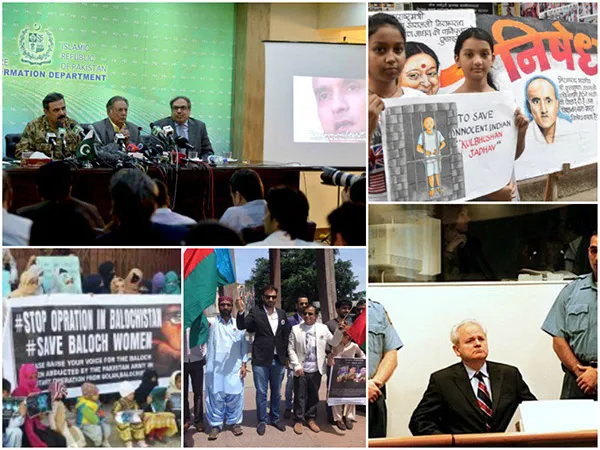In the din of rhetoric between India and Pakistan over the Kulbhushan Jadhav case, the most jarring question is why Pakistan chose to hastily court martial and sentence to death an Indian national on charges of spying. The sudden and provocative nature of the trial and sentence undermines any notion that back channels were working to thaw the freeze that has set into India Pakistan ties for well over a year now. Some have argued that the immediate provocation is the alleged disappearance of a retired Pakistani colonel, Muhammad Habib Zahir, from Nepal. No further information has surfaced about Zahir’s disappearance. But even if, for the sake of argument, one were to accept that Zahir is in Indian custody and the Pakistanis are trying to push for a swap, will it be possible?
Former diplomats suggest the government is caught in a tough place – the loud statements against Jadhav’s death sentence could push the Pakistan government into a corner, making them either unwilling to negotiate, or unable to withstand domestic pressure against any negotiation. But Delhi had no choice either. Staying quiet was not an alternative – the government would have come across as insensitive to the fate of an Indian national in Pakistani custody. Former intelligence officials familiar with the fault-lines between Pakistan’s military and civilian establishments suggest India’s hope for a swap might well be optimistic, and the message behind Jadhav’s sentence is simply that their military men should be left alone. The message is as much for India, as it is for Pakistani Prime Minister Nawaz Sharif who has been unable to assert his authority with the military over an India policy and currently faces growing domestic opposition over corruption.
Jadhav’s death sentence coincides with tensions boiling over in Kashmir once again. The dismal turnout during the by-elections and mounting civilian casualties were capped by the one public relations disaster that India could have done without – the image of the Indian army violating human rights, their own code of conduct and international conventions governing warfare in a video that shows a man tied to an army vehicle and being driven around in the Valley. The Indian army has ordered an inquiry into the incident, but preliminary arguments have been made in defence of the soldiers who tied the man to the front of their jeep, saying they did so to avoid bloodshed. But there can be no debate about the fact that soldiers from a national, voluntary armed force should, and must, be held accountable to a higher professional and moral standard than stone pelting mobs.
The images and polarised debate around them are not lost on an international community watching developments in India closely – especially since the ascent of Adityanath as chief minister of Uttar Pradesh and the subsequent, disturbing concerns over an emboldened right wing. These trends could put Delhi on the defensive globally. Pakistan, which has paraded Jadhav’s doubtful and dubious presence and arrest in Baluchistan and his badly edited “confession” as proof of India’s meddling in the restive province, is putting together a fresh dossier against India to present to the international community. US envoy to the UN Nikki Haley has indicated the Trump administration’s willingness to ‘mediate’ between India and Pakistan.
Against this backdrop, it is likely that Pakistan might have decided to use Jadhav’s trial and sentence as an attempt to bait India into seeking international intervention to bring him back home. If that is the intention, however, Islamabad has miscalculated. With sketchy evidence against Jadhav at best, and a repeated denial of consular access to him for Indian officials, Pakistan’s position on Jadhav globally, despite its all-weather friend China’s support, is weak. And if, as many believe, India’s current strategy on Kashmir is to adopt the Doval Doctrine (named after the current national security advisor Ajit Doval), which essentially rejects a policy of ‘appeasement’ and suggests instead tackling it primarily as a law and order problem, there is no way Delhi will fall into the trap of appealing internationally for Jadhav.
Irrespective of the simmering cauldron that is Kashmir today, Delhi seems to be making it clear it has no desire to engage even with local Kashmiris, let alone Islamabad, on finding a way to arrest the flow of blood in the Valley. In 2016, just before the latest cycle of unrest began, Prime Minister Narendra Modi had assured a delegation of Kashmiri politicians that the Valley would not be used as a political football to garner votes in elections. The Uttar Pradesh assembly election campaign saw that promise fall by the wayside. As the rhetoric peaks on both sides of the border, and Kashmir boils, Delhi must ask whether this is the international image it wants for itself after decades of diplomacy that led to India become a major global player economically and strategically.
The polarisation around a worsening ground situation in Kashmir, the death sentence on Jadhav, and the general ratcheting up of rhetoric in India and Pakistan only serves to feed into this narrative of aggressive nationalism that’s taken centre stage in India’s political discourse. It is now for the prime minister and the ruling party to think beyond domestic politics. Lives are at stake. Not just of soldiers and civilians in Kashmir, but that of a man India maintains is innocent and has been deliberately trapped by Pakistan in a web of espionage, conflict and politics.
This commentary originally appeared in The Wire.
The views expressed above belong to the author(s). ORF research and analyses now available on Telegram! Click here to access our curated content — blogs, longforms and interviews.




 PREV
PREV



